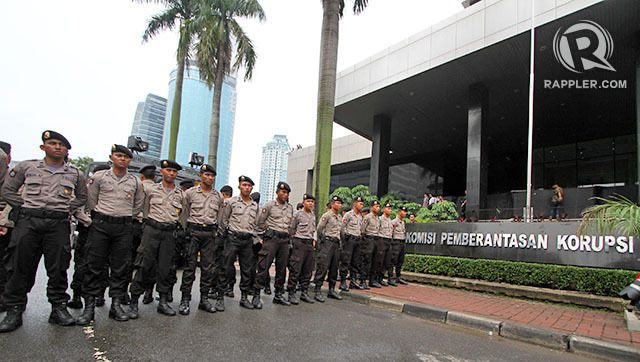SUMMARY
This is AI generated summarization, which may have errors. For context, always refer to the full article.

JAKARTA, Indonesia – The Corruption Eradication Commission (KPK) wants additional powers and legislation to allow the commission to investigate the military.
Commissioner of the KPK Saut Situmorang said if the KPK was to be efficient and comprehensive it must be able to look into the military.
“Do not forget the Commission’s mission is to be efficient and effective. If it is inefficient, ineffective, we are looking for corruption but cannot prosecute them,” he said on Thursday, January 21.
“We cannot go on without a law. Everything in Indonesia has laws, they cannot just play like that.”
The call comes despite Indonesia rising in Transparency International (TI)’s Government Defense Anti-Corruption Index Report.
Previously ranked a “Very High Corruption Risk” in 2013 on TI’s A-F ranking of countries, Indonesia is now seen as in the 4th band, under “High Corruption Risk”.
Tehmina Abbas, one of the authors of the report, said Indonesia’s rise was due to “a lot more commitment to anti-corruption measures” from the government.
Abbas also said other factors that contributed to Indonesia’s rise was more transparency in military persecutions, limited military involvement in business and more compliance to the UN anti-corruption agreement.
Undeserved?
However, Al Araf of the Indonesian Human Rights Monitor (Imparisal), believes Indonesia doesn’t deserve to climb up the rankings.
“In fact, we might have gotten worse,” he said. “Nothing has actually changed, it’s just words.”
Araf said there is no political will to end the corruption.
“The change needs to come from Parliament. Political parties need to have the goodwill to change what is happening,” he said.
“We need to keep pushing the government for change.”
He backed Situmorang’s belief that the KPK needs additional powers to investigate the military.
The report noted Indonesia was ripe for military corruption, saying funds allocated for the military by the government “just don’t cover minimum requirements.”
The report also said TI found evidence of military involvement in providing “paid protection for companies operating West Papua, drug trafficking, illegal logging, as well as clashes between the military and police over an illegal fuel storage depot in Batam.”
The escalation of military spending in the South East Asia region was also noted. China has increased military spending by 441% since the last report in 2013, India by 165% and Indonesia by 189% according to the report.
Despite this, the report said Indonesia’s defense budget “formed just 50% of military requirements,” meaning “5 to 20%” of the military’s budget came from “huge businesses and large-scale unsanctioned exploitation of natural resources,” despite attempts to remove the military from private business in 2009.
Indonesia’s increased military spending also hasn’t been matched by an increase in “checks and balances,” which the report said was a red flag for corruption.
Consequences
Another reason why improving the system is important?
The report said a lack of accountability can drive people towards extremist groups like the Islamist State in Iraq and Syria (ISIS) and Boko Haram.
“Boko Haram, ISIS, the Taliban, they all prey on those who are disillusioned and affected by government corruption,” said Abbas.
“When we looked at why people joined the Taliban, the two biggest reasons were government corruption and the presence of international security coalitions.”
She added, “Military corruption is divisive. The main role of a country’s defense institution is to bring peace and stability to its citizens. It only takes one or two instances of corruption to destroy that.”
The results are especially significant after the Jakarta attacks on Thursday, January 14. The attacks that involved shootings and bombings killed 8 people including 4 terrorists and 4 civilians and were claimed by ISIS.
This, as ISIS has expressed interest in forming a wilayat (province) in Indonesia, and as those involved in the deradicalization movement warn the Indonesian government to address root causes of terrorism like poverty and social inequality. – Rappler.com
Add a comment
How does this make you feel?
There are no comments yet. Add your comment to start the conversation.